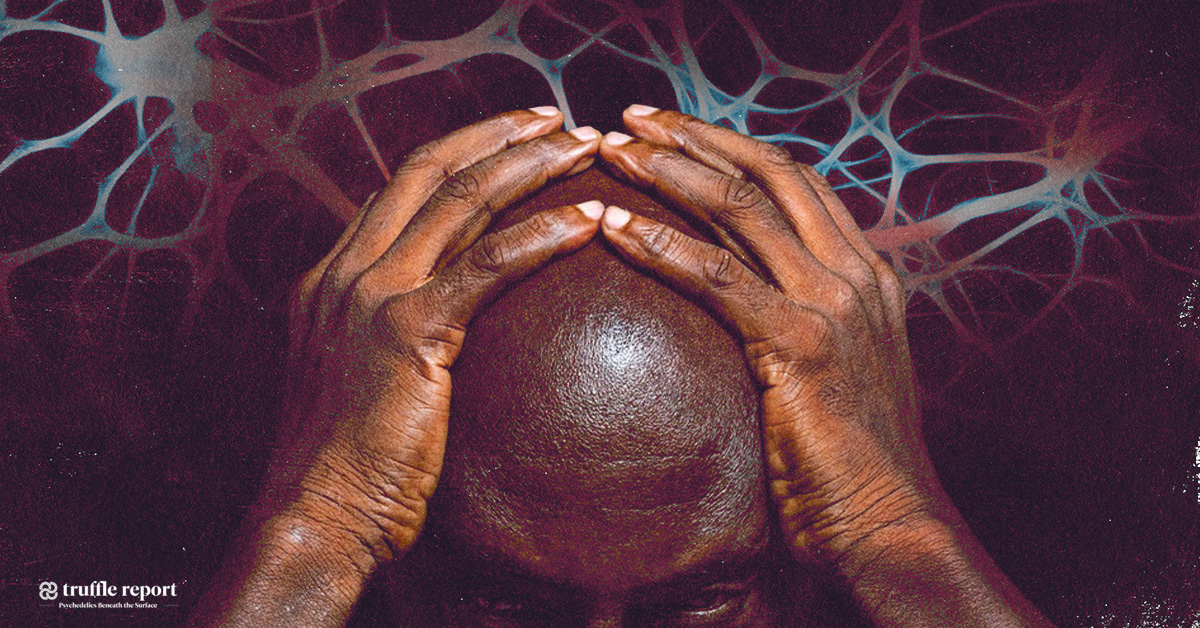One UK Drug Developer Has a Clinical Trial in the Works to Find Out
Headaches can be more complicated than most realize. From migraines to cluster headaches, the human head continues to be the leading cause of disability and suffering in the world. Up to 75 percent of adults worldwide have experienced a headache in the past year, yet they remain underestimated, underrecognized and undertreated. Frequent or severe headaches can affect a person’s quality of life, day-to-day routine, and relationships, leading to depression and anxiety. With the rise of psychedelic research, that may soon change. Truffle Report looks into SUNHA headaches, psychedelics, and the research behind them.
What is a SUNHA Headache?
Short-lasting unilateral neuralgiform headache attacks (SUNHA) belong to a group of headache disorders known as Trigeminal Autonomic Cephalalgias (TACs). The International Classification of Headache Disorders (ICHD) defines SUNHA headaches as “attacks of moderate or severe, strictly unilateral head pain lasting from seconds to minutes, occurring at least once a day and usually associated with prominent lacrimation and redness of the ipsilateral eye.”
Although this type of headache is relatively rare, its attacks are easy to recognize. According to ICHD, the diagnosis is defined by the following diagnostic criteria:
- Have a minimum of 20 attacks that fulfill the criteria of headache being at least moderate-intensity in the orbital or temporal area on one side and lasting for 1–600 seconds
- Stuffy or runny nose
- Sweating and redness of head and neck
- Eyelid swelling on the headache side
- Redness and tearing of the eyes
- Occurring at least once a day
SUNHA headaches are more common in men than women and are typically diagnosed between the ages of 35 and 65. The headache can be triggered by eating or chewing, neck flexing, bending forward, talking, washing or brushing hair, exercise, and different kinds of light (from sunlight to lamp light).
There are two subtypes of SUNHA headaches
- Short-lasting unilateral neuralgiform headache attacks with conjunctival injection and tearing (SUNCT)
- Short-lasting unilateral neuralgiform headache attacks with cranial autonomic symptoms (SUNA).
SUNHA is generally treated off-label using medicines like lamotrigine, carbamazepine, oxcarbazepine, and topiramate.
Beckley Psytech Clinical Trial
SUNHA headaches are different from the cluster or “suicide headaches” around which some psychedelic research and anecdotal evidence already exists. At the moment, researchers are focused primarily on migraines and cluster headaches with studies from Yale University, an LSD double-blind trial for cluster headaches at University Hospital Basel, Switzerland, and a pilot psilocybin study for cluster headaches in Denmark.
UK-based Beckley Psytech will be the first to evaluate the potential benefits of psilocybin in the treatment of SUNHA headaches. The company received Clinical Trial Authorisation from the UK Medicine and Healthcare Product Regulatory Agency (MHRA) to explore the effects of psilocybin for treating SUNHA headaches.
“SUNHA is a crippling condition for which there is very limited research and no currently approved medications. We believe that psychedelic medicine has the potential to make a significant difference to the quality of life of patients suffering with this disease, and are very excited to receive approval for our clinical trial and to further investigate the safety profile and efficacy of psilocybin as a treatment,” said Dr. Fiona Dunbar, Chief Medical Advisor.
As part of a Phase 1b clinical trial, Beckley Psytech will enroll 12 patients suffering from SUNHA headaches. According to the press release, the study is “a multi-dose, dose escalation trial in patients suffering with 5+/day attacks over the last two weeks, to evaluate proof of concept efficacy by analysing the impact on frequency, duration and severity of headaches. The study will enrol up to 12 patients to assess the proof-of-concept efficacy of psilocybin and determine the maximum tolerated dose (MTD) or recommended dose for further development. On day one patients will receive dose one, on day six dose two, on day 11 dose three, with a follow up visit on day 25.”
Goals of the SUNHA Headache Study
The study aims to:
- Determine the safety and tolerability of psilocybin when administered to patients with chronic SUNHA
- Determine the effects of psilocybin on cognition when administered to patients with chronic SUNHA
- Explore the change in frequency, duration, and intensity of headache attacks with escalating doses of psilocybin in patients with chronic SUNHA
Beckley Psytech recently announced it had raised $80 million in second-round financing that will be used to fund the development of its psilocybin and 5-MeO-DMT research into neuropsychiatric disorders.
The capital will be used to complete an ongoing Phase 1b trial, which is focused on the application of low-dose psilocybin in patients suffering from SUNHA. The proceeds will also finance the launch of a Phase 1 clinical study on a novel formulation of 5-MeO-DMT, which the company plans to move into a Phase 2 clinical trial, studying the formulation in patients with treatment-resistant depression.
“My life’s passion has been to unlock the therapeutic potential of psychedelics as I believe these compounds could help millions of people around the world. The progress Beckley Psytech has made in attracting exceptional talent to the team and advancing our ambitious clinical development programmes over the past two years has been tremendously exciting. As we embark on our next phase of growth, our strong syndicate of expert investors will support us in bringing much-needed innovative treatments to patients suffering from neurological and psychiatric conditions,” said Cosmo Feilding Mellen, CEO of Beckley Psytech.
On September 14, 2021, the company announced that the first patient has received their first dose.
“We are very excited to initiate this world-first clinical trial with Dr. Matharu and Dr. Lambru. This represents a significant milestone for Beckley Psytech and the patients for whom this product has the potential to benefit. SUNHA is a severely debilitating disease which affects thousands of patients, and for which there is no currently approved treatment. The potential medical advantages of psychedelic agents, such as psilocybin, could be transformational to the quality of life for those affected by this disease. Following on from our recent highly successful $80 million funding round and MHRA approval for the upcoming 5-MeO-DMT Phase I clinical trial, we are delighted to achieve this additional milestone,” said Mellen.
The outcome data for Phase 1b is expected to be available in early 2022.

















